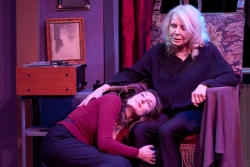Tommorrow, brought to Los Angeles by the Skylight Theatre Company, Rogue Machine and York Theatre Royal, United Kingdom, explores the interaction and resultant relationship between a seasoned actress, Laura played by Jenn Robbins that has been newly cast as Lady Macbeth and the mentor that she seeks out in an elderly, once prolific but now reclusive, actress and her equally reclusive nephew.
Both Abigail, played by Salome Jens and her nephew Jaime, played by Geoffrey Forward, agree to coach Laura for six days, with Abigail agreeing to give her pronouncement as to whether or not Laura is capable of executing the role of Lady Macbeth at their conclusion.
Freed’s exploration of Lady Macbeth’s character and her relationship with Macbeth is fascinating and thoroughly plants the seed of desire to pick up Shakespeare’s work and reacquaint oneself with those characters all over again. Unfortunately, these explorations, which are the most engaging parts of the production, only esoterically further the plot of the actual play.
The myriad subplots laced throughout – George W. Bush’s theft of the 2000 election as a parallel of Macbeth’s theft of the crown; the “rooted sorrow” that each character holds as a parallel of Lady Macbeth’s; the book chronicling the Mad Booth’s versus the madness of Macbeth and his Lady; the questioning of Jaime’s exact lineage as a parallel of whether or not Lady Macbeth was always childless – all these serve better as a pique for a deeper dramaturgical study of Macbeth than as a way to enlighten and inform about the three characters of the play.
With this greater emphasis on Shakespeare, it often became tedious to try to empathize or connect with Freed’s characters. Instead of providing back-stories for them, all roads lead back to Macbeth, where only far-reaching conclusions were to be found.
Both Jens and Forward deliver admirable performances. Jens exudes the grace and presence expected of a seasoned actress at the end of her life, while Forward is able to come across as a broken man, without ever eliciting pity. However, like the role of Andrew Rally in I Hate Hamlet, the actor cast in the role of Laura has to not only be able to pull off the scripted character, but the Shakespearean character as well, or the illusion is ruined.
Robbins does a spectacular job in bringing Laura, a pathological narcissist with self-esteem issues, to life. However, her Lady Macbeth lacks the conviction and strength that is required for that role.
Damian Cruden’s direction does little to help Robbins undertake her duality, especially in a particularly awkward moment where Robbins lays her head in Jens’ lap and calls her “mama.However, this awkward moment is eclipsed by an even more puzzling occurrence in the final scene. With the rehearsals over the focus falls to Laura and Jaime, the characters that have only been partially developed, to carry the climax and denouement and they must do so through some very bizarre and arcane staging.
This production draws out more questions than it does answers. At one point Laura questions Abigail as to whether their explorations into Lady Macbeth’s character are venturing too far away from the actual story of Macbeth. This critic wonders the same thing about Tomorrow. Does this play get so caught up in the symbolism and subtext that in the end, the story it set out to tell becomes lost in the telling? To quote Macbeth, it is “full of sound and fury, signifying nothing.”
Kat Michels is a two time regional Emmy award-winning writer with an AAS in video production and a BFA in theatre.
“Tomorrow”
Skylight Theatre Company, Rogue Machine and York Theatre Royal
Through April 21
Tickets: www.ktcla.com or 702-582-8587

